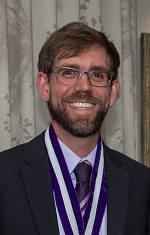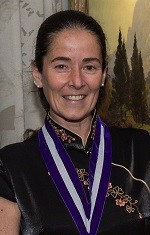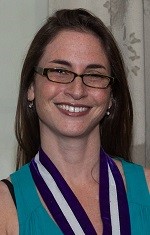Click on a name to hear what Jeremy Birnholtz, Michael Jewett, Nick Davis, Francesca Tataranni, and Erin Waxenbaum have to say!
This year marks the 25th anniversary of the Northwestern University Teaching Awards. Awards are conferred annually to individual faculty members through the Office of the Provost for their outstanding performance and dedication to undergraduate education. Recipients come from across all six Evanston undergraduate schools and NU-Qatar, and are celebrated for their contribution to student learning. Indeed, many of these professors have designed new courses and curricula to ensure each student has the tools to succeed in life outside the classroom.
To commemorate this occasion, Northwestern held an event to honor both this year’s and past winners. A number of former students contributed remarks detailing their experiences in the classroom. And while the individual faculty approaches differ, the result is largely the same – above all, students say, these professors have instilled in them a life-long love of learning.
To better understand these outstanding faculty’s approach to teaching, I met with a number of the current recipients to find out how they connect with students and what advice they would offer to colleagues beginning their careers at Northwestern.
Recipients of the 2017 Charles Deering McCormick Professor of Teaching Excellence Awards:
We have really good undergrads and it's important to push them and let them show you that they're great.
Jeremy Birnholtz
Associate Professor in Communication Studies, School of Communication, and Associate Professor of Electrical Engineering and Computer Science, McCormick School of Engineering
Jeremy Birnholtz’s commitment to improving the undergraduate experience is demonstrated through the vast number of ways he engages student learning.
"Students appreciate learning about things that they live every day. Being able to look at something like Snapchat or Instagram through the lens of theories on human behavior really opens their eyes. They have a reaction sort of like, ‘Oh, yeah. This thing that I thought was really new is something that's been going on for a long time and we're just doing it differently now.’ Students tend to think of academics as being something separate from their everyday life. Being able to bring it into their lives in a way that resonates with them is really useful.
"We have really good undergrads and it's important to push them and let them show you that they're great. Not so much from an ‘everybody gets a trophy’ kind of perspective, but because they learn more if you give them harder assignments. Don't just make class a matter of jumping through hoops and getting an A; give them real problems and show them that you take these things seriously. They will do great work.”
If you treat students as individuals and try to provide information that allows all learners to learn, it will create an environment where a student wants to be there.
Michael Jewett
Associate Professor of Chemical and Biological Engineering, McCormick School of Engineering
Michael Jewett has dedicated himself “to high quality education in the chemical and biological engineering sciences.”
“I try to make sure that I treat all students as individuals. Students have different learning styles and have different learning needs. If you treat students as individuals and try to provide information that allows all learners to learn, it will create an environment where a student wants to be there.
“The more you show students that you care, the more they will invest in your class and, frankly, the more fun it is for you. Every single class that I go to, I start off very similarly – which is by saying, ‘You know, I hope this class goes as well as you do.’ The students and I have a partnership and I figure that if we're both learning, I'm doing my job right.”
Recipient of the 2017 The Alumnae of Northwestern Teaching Professor Award:
I don’t want them to think that the writing we do in the classroom is necessarily different from how we talk or that they suddenly have to change when they walk through the door.
Nick Davis
Associate Professor in English and Gender Studies, Weinberg College of Arts and Sciences
Nick Davis’s undergraduate teaching ranges across the entire spectrum, from large first-year seminars to research-intensive one-on-one advising.
“I'm interested in teaching students to write more ambitiously in a scholarly register, but also to say what they mean with knowledge backing it up when writing in conversational forms – things that could fly on their blog or in the student newspaper. I don’t want them to think that the writing we do in the classroom is necessarily different from how we talk or that they suddenly have to change when they walk through the door.
“I was given some great advice when I started and that was to think about offering a mid-sized course that I would really enjoy teaching a few times in short succession both to get comfortable with what would be a home-base course but also to become slightly more visible in relationship to some topics that I could imagine upper-level seminars branching off of. Start from someplace that you can repeat a few times and not get bored. From there, start branching out. It can be really tempting to throw every course idea you've ever had at the wall when suddenly people want you to propose things. That served me really well and I met a lot of students who I share common interests with. And then from that point, I felt I could take more risks and teach things that I felt less solidly prepared for and that became and continues to be a really constructive and fun adventure.”
Recipient of the 2017 Charles Deering McCormick Distinguished Professor of Instruction Awards:
I really try to make the material I teach speak to my students the way it speaks to me.
Francesca Tataranni
Professor of Instruction in Classics, Weinberg College of Arts and Sciences
Francesca Tataranni aims to bring a passion for teaching Classics, a commitment to rigor, and creativity to her classroom.
“I really try to make the material I teach speak to my students the way it speaks to me. I want them to find a way to understand the importance of it from their own unique perspectives.
“As a faculty member, don’t be afraid to get out of your comfort zone. Be creative and ask for help from your colleagues because teamwork is usually where great things happen.”
Recipient of the 2017 Charles Deering McCormick Distinguished Lecturer Award:
Having demonstrations of material whether it’s digital or physical is a great way to engage students in what you're passionate about.
Erin Waxenbaum
Senior Lecturer in Anthropology, Weinberg College of Arts and Sciences
Erin Waxenbaum believes “education should be collaborative, inclusive and integrative” and has translated this ideology, with the support of two Hewlett Fund for Curricular Innovation Awards, into an experiential teaching pedagogy.
“Having students be able to not only read or hear information but to actually confirm it for themselves with physical material is both really helpful for the learning process and also makes for more engaged classes. With anatomy and evolution, it’s one thing to talk about it and see pictures but it’s another to actually hold a series of skulls and talk about the size of different components of the face and how they’ve changed over time.
“The objective of teaching is to engage people in what you're talking about. By having demonstrations of material whether it’s digital or physical is a great way to engage students in what you're passionate about. It helps inspire their own passion, even in the students that are less engaged. I like hearing students say, ‘You know, when I signed up for the course I wasn’t really interested but I enjoyed learning the material.’ Whether they're going to use that material later on in life doesn't always matter. While they were there in class and in the moment they enjoyed learning, and hopefully they will take a smattering of that into their future whether academically or personally.”
For more information about the University Teaching Awards, visit the About the Awards page or send an email to teachingawards@northwestern.edu.




